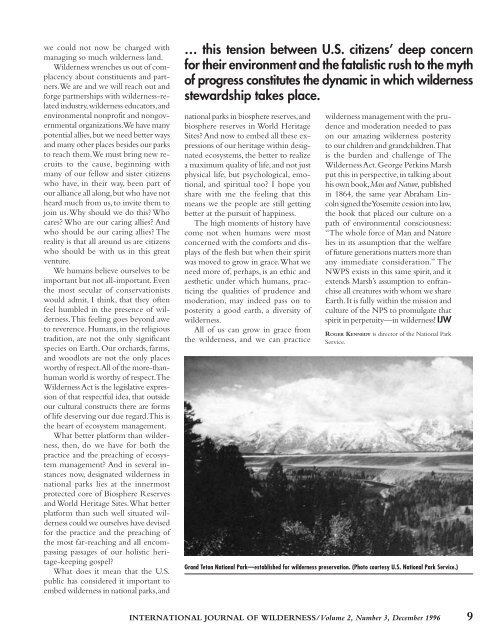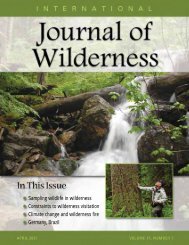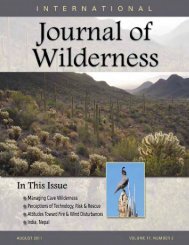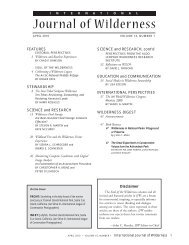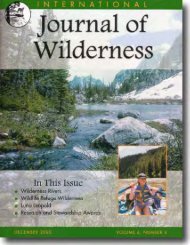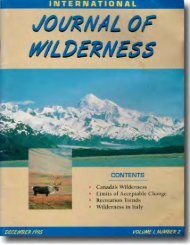P3-Vol 2.No3 Dec 96 - International Journal of Wilderness
P3-Vol 2.No3 Dec 96 - International Journal of Wilderness
P3-Vol 2.No3 Dec 96 - International Journal of Wilderness
Create successful ePaper yourself
Turn your PDF publications into a flip-book with our unique Google optimized e-Paper software.
we could not now be charged with<br />
managing so much wilderness land.<br />
<strong>Wilderness</strong> wrenches us out <strong>of</strong> complacency<br />
about constituents and partners.<br />
We are and we will reach out and<br />
forge partnerships with wilderness-related<br />
industry, wilderness educators, and<br />
environmental nonpr<strong>of</strong>it and nongovernmental<br />
organizations. We have many<br />
potential allies, but we need better ways<br />
and many other places besides our parks<br />
to reach them. We must bring new recruits<br />
to the cause, beginning with<br />
many <strong>of</strong> our fellow and sister citizens<br />
who have, in their way, been part <strong>of</strong><br />
our alliance all along, but who have not<br />
heard much from us, to invite them to<br />
join us. Why should we do this? Who<br />
cares? Who are our caring allies? And<br />
who should be our caring allies? The<br />
reality is that all around us are citizens<br />
who should be with us in this great<br />
venture.<br />
We humans believe ourselves to be<br />
important but not all-important. Even<br />
the most secular <strong>of</strong> conservationists<br />
would admit, I think, that they <strong>of</strong>ten<br />
feel humbled in the presence <strong>of</strong> wilderness.<br />
This feeling goes beyond awe<br />
to reverence. Humans, in the religious<br />
tradition, are not the only significant<br />
species on Earth. Our orchards, farms,<br />
and woodlots are not the only places<br />
worthy <strong>of</strong> respect. All <strong>of</strong> the more-thanhuman<br />
world is worthy <strong>of</strong> respect. The<br />
<strong>Wilderness</strong> Act is the legislative expression<br />
<strong>of</strong> that respectful idea, that outside<br />
our cultural constructs there are forms<br />
<strong>of</strong> life deserving our due regard. This is<br />
the heart <strong>of</strong> ecosystem management.<br />
What better platform than wilderness,<br />
then, do we have for both the<br />
practice and the preaching <strong>of</strong> ecosystem<br />
management? And in several instances<br />
now, designated wilderness in<br />
national parks lies at the innermost<br />
protected core <strong>of</strong> Biosphere Reserves<br />
and World Heritage Sites. What better<br />
platform than such well situated wilderness<br />
could we ourselves have devised<br />
for the practice and the preaching <strong>of</strong><br />
the most far-reaching and all encompassing<br />
passages <strong>of</strong> our holistic heritage-keeping<br />
gospel?<br />
What does it mean that the U.S.<br />
public has considered it important to<br />
embed wilderness in national parks, and<br />
… this tension between U.S. citizens’ deep concern<br />
for their environment and the fatalistic rush to the myth<br />
<strong>of</strong> progress constitutes the dynamic in which wilderness<br />
stewardship takes place.<br />
national parks in biosphere reserves, and<br />
biosphere reserves in World Heritage<br />
Sites? And now to embed all these expressions<br />
<strong>of</strong> our heritage within designated<br />
ecosystems, the better to realize<br />
a maximum quality <strong>of</strong> life, and not just<br />
physical life, but psychological, emotional,<br />
and spiritual too? I hope you<br />
share with me the feeling that this<br />
means we the people are still getting<br />
better at the pursuit <strong>of</strong> happiness.<br />
The high moments <strong>of</strong> history have<br />
come not when humans were most<br />
concerned with the comforts and displays<br />
<strong>of</strong> the flesh but when their spirit<br />
was moved to grow in grace. What we<br />
need more <strong>of</strong>, perhaps, is an ethic and<br />
aesthetic under which humans, practicing<br />
the qualities <strong>of</strong> prudence and<br />
moderation, may indeed pass on to<br />
posterity a good earth, a diversity <strong>of</strong><br />
wilderness.<br />
All <strong>of</strong> us can grow in grace from<br />
the wilderness, and we can practice<br />
wilderness management with the prudence<br />
and moderation needed to pass<br />
on our amazing wilderness posterity<br />
to our children and grandchildren. That<br />
is the burden and challenge <strong>of</strong> The<br />
<strong>Wilderness</strong> Act. George Perkins Marsh<br />
put this in perspective, in talking about<br />
his own book, Man and Nature, published<br />
in 1864, the same year Abraham Lincoln<br />
signed the Yosemite cession into law,<br />
the book that placed our culture on a<br />
path <strong>of</strong> environmental consciousness:<br />
“The whole force <strong>of</strong> Man and Nature<br />
lies in its assumption that the welfare<br />
<strong>of</strong> future generations matters more than<br />
any immediate consideration.” The<br />
NWPS exists in this same spirit, and it<br />
extends Marsh’s assumption to enfranchise<br />
all creatures with whom we share<br />
Earth. It is fully within the mission and<br />
culture <strong>of</strong> the NPS to promulgate that<br />
spirit in perpetuity—in wilderness! IJW<br />
ROGER KENNEDY is director <strong>of</strong> the National Park<br />
Service.<br />
Grand Teton National Park—established for wilderness preservation. (Photo courtesy U.S. National Park Service.)<br />
INTERNATIONAL JOURNAL OF WILDERNESS/<strong>Vol</strong>ume 2, Number 3, <strong>Dec</strong>ember 19<strong>96</strong> 9


